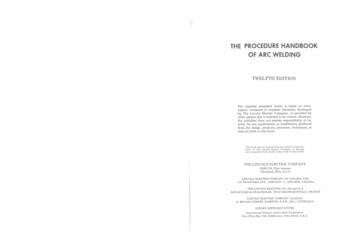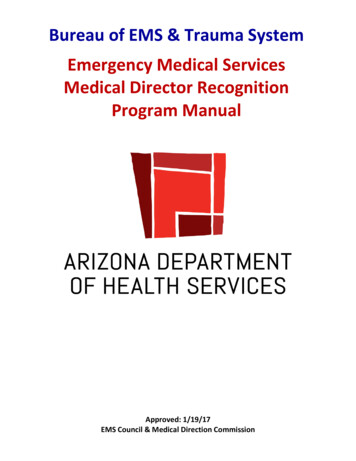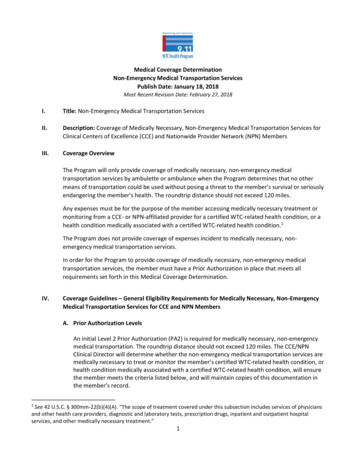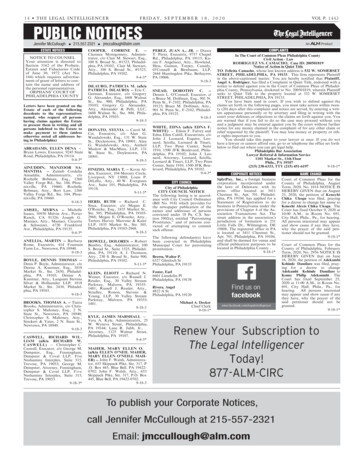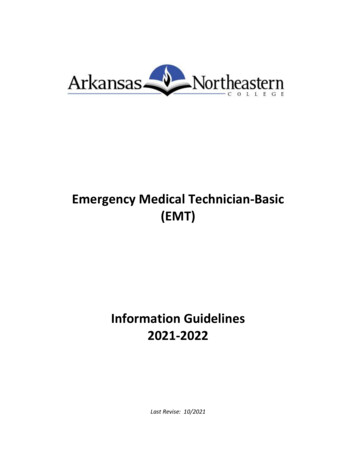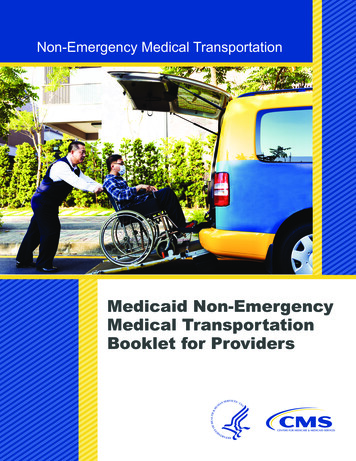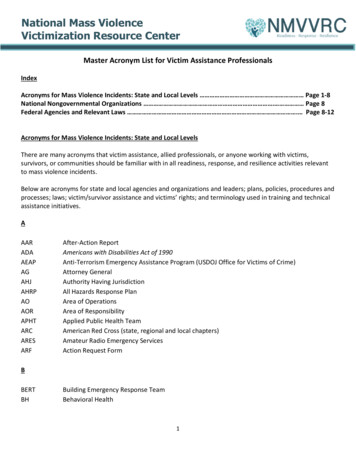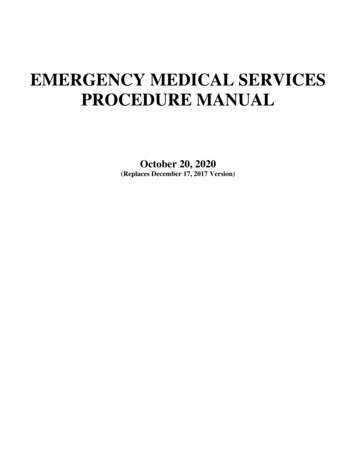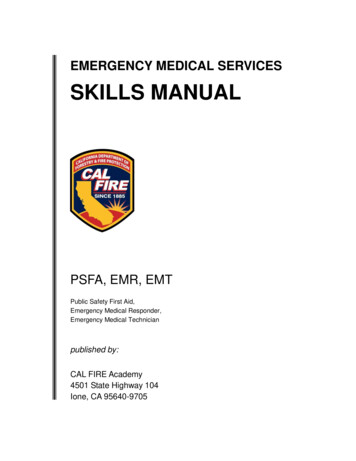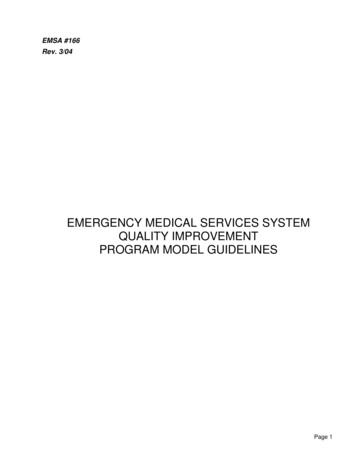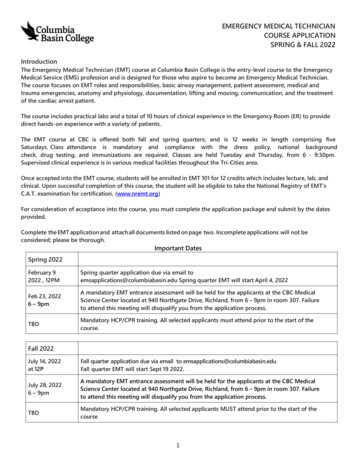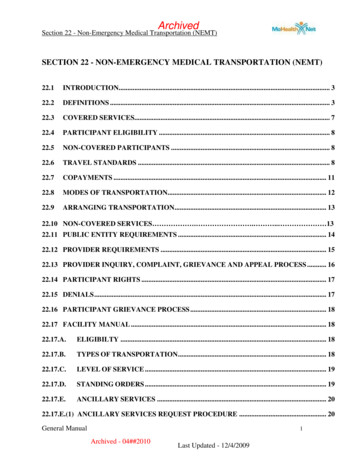
Transcription
ArchivedSection 22 - Non-Emergency Medical Transportation (NEMT)SECTION 22 - NON-EMERGENCY MEDICAL TRANSPORTATION (NEMT)22.1INTRODUCTION. 322.2DEFINITIONS . 322.3COVERED SERVICES. 722.4PARTICIPANT ELIGIBILITY . 822.5NON-COVERED PARTICIPANTS . 822.6TRAVEL STANDARDS . 822.7COPAYMENTS . 1122.8MODES OF TRANSPORTATION. 1222.9ARRANGING TRANSPORTATION. 1322.10 NON-COVERED SERVICES . . . 1322.11 PUBLIC ENTITY REQUIREMENTS . 1422.12 PROVIDER REQUIREMENTS . 1522.13 PROVIDER INQUIRY, COMPLAINT, GRIEVANCE AND APPEAL PROCESS . 1622.14 PARTICIPANT RIGHTS . 1722.15 DENIALS . 1722.16 PARTICIPANT GRIEVANCE PROCESS . 1822.17 FACILITY MANUAL . 1822.17.A.ELIGIBILTY . 1822.17.B.TYPES OF TRANSPORTATION . 1822.17.C.LEVEL OF SERVICE . 1922.17.D.STANDING ORDERS . 1922.17.E.ANCILLARY SERVICES . 2022.17.E.(1) ANCILLARY SERVICES REQUEST PROCEDURE . 20General Manual1Archived - 04##2010Last Updated - 12/4/2009
ArchivedSection 22 - Non-Emergency Medical Transportation (NEMT)22.17.F.WHERE'S MY RIDE? (WMR) . 2322.17.G.QUALITY ASSURANCE (QA) PROCEDURE . 2322.17.H.FREQUENTLY ASKED QUESTIONS . 23General Manual2Archived - 04##2010Last Updated - 12/4/2009
ArchivedSection 22 - Non-Emergency Medical Transportation (NEMT)SECTION 22-NON-EMERGENCY MEDICAL TRANSPORTATION (NEMT)22.1 INTRODUCTIONThis section contains information pertaining to the Non-Emergency Medical Transportation’s(NEMT) direct service program. The NEMT Program provides for the arrangement of transportationand ancillary services by a transportation broker. The broker may provide NEMT services eitherthrough direct service by the broker and/or through subcontracts between the broker andsubcontractor(s).The purpose of the NEMT Program is to assure transportation to MO HealthNet participants who donot have access to free appropriate transportation to and from scheduled MO HealthNet coveredservices.The Missouri NEMT Program is structured to utilize and build on the existing transportationnetwork in the state.The NEMT Program is operated as a Prepaid Ambulatory Health Plan (PAHP). A PAHP allows theMO HealthNet Division (MHD) to waive the freedom of choice requirements. This means that thestate can have one statewide transportation broker and the broker determines the transportationprovider who provides each transport.22.2 DEFINITIONSThe following definitions apply for this program:ActionThe denial, termination, suspension, or reduction of an NEMTservice.Ancillary ServicesMeals and lodging are part of the transportation package forparticipants when the participant requires a particular medicalservice which is only available in another city, county, or stateand the distance and travel time warrants staying in that placeovernight.AppealThe formal mechanism which allows a provider the right toappeal a grievance decision.AttendantAn individual who goes with a participant under the age of 21 tothe MO HealthNet covered service to assist the participantbecause they cannot travel alone or a long distance withoutassistance. An attendant is an employee of, or hired by theGeneral Manual3Archived - 04##2010Last Updated - 12/4/2009
ArchivedSection 22 - Non-Emergency Medical Transportation (NEMT)broker or an NEMT provider.BrokerContracted entity responsible for enrolling and paying providers,determining the least expensive and most appropriate type oftransportation, authorizing transportation and ancillary services,and arranging and scheduling transportation for eligibleparticipants to MO HealthNet covered services.ContractorReference to "contractor" in the Terms and Conditions attachedhereto shall refer to the broker.Clean ClaimA claim that can be processed without obtaining additionalinformation from the provider of the service or from a thirdparty.ComplaintA verbal or written expression by a provider which indicatesdissatisfaction or dispute with a participant, broker policies andprocedures, claims, or any aspect of broker functions.DCNDepartmental Client Number. A unique eight-digit numberassigned to each individual who applies for MO HealthNetbenefits. The DCN is also known as the MO HealthNetIdentification Number.EmergencyA medical or mental health condition manifesting itself by acutesymptoms of sufficient severity (including severe pain) that aprudent layperson, who possesses an average knowledge ofhealth and medicine, could reasonably expect the absence ofimmediate medical attention could reasonably be expected toresult in placing the participant’s physical or mental health (or,with respect to a pregnant woman, the health of the woman orher unborn child) in serious jeopardy, serious impairment tobodily functions, serious dysfunction of any bodily organ or part,serious harm to self or others due to an alcohol or drug abuseemergency, injury to self or bodily harm to others, or withrespect to a pregnant woman having contractions: (1) that thereis inadequate time to effect a safe transfer to another hospitalbefore delivery, or (2) that transfer may pose a threat to thehealth or safety of the woman or the unborn child.FraudAny type of intentional deception or misrepresentation made byan entity or person with the knowledge that the deception couldGeneral Manual4Archived - 04##2010Last Updated - 12/4/2009
ArchivedSection 22 - Non-Emergency Medical Transportation (NEMT)result in some unauthorized benefit to the entity, himself/herself,or some other person.Free TransportationAny appropriate mode of transportation that can be secured bythe participant without cost or charge, either through volunteers,organizations/associations, relatives, friends, or neighbors.Grievance(Participant)A verbal or written expression of dissatisfaction from theparticipant about any matter, other than an action. Possiblesubjects for grievances include, but are not limited to, the qualityof care or services provided, condition of mode of transportation,aspects of interpersonal relationships such as rudeness of aprovider or employee, or failure to respect the ider)A written request for further review of a provider’s complaintthat remains unresolved after completion of the complaintprocess.InquiryA request from a transportation provider regarding informationthat would clarify the broker’s policies and procedures, or anyaspect of broker function that may be in question.Most AppropriateThe mode of transportation that accommodates the participant’sphysical, mental, or medical condition.MO HealthNetCovered ServicesCovered services under the MO HealthNet program.MedicallyNecessaryService(s) furnished or proposed to be furnished that is (are)reasonable and medically necessary for the prevention,diagnosis, or treatment of a physical or mental illness or injury;to achieve age appropriate growth and development; to minimizethe progression of a disability; or to attain, maintain, or regainfunctional capacity; in accordance with accepted standards ofpractice in the medical community of the area in which thephysical or mental health services are rendered; and service(s)could not have been omitted without adversely affecting theparticipant’s condition or the quality of medical care rendered;and service(s) is (are) furnished in the most appropriate setting.Services must be sufficient in amount, duration, and scope toreasonably achieve their purpose and may only be limited byGeneral Manual5Archived - 04##2010Last Updated - 12/4/2009
ArchivedSection 22 - Non-Emergency Medical Transportation (NEMT)medical necessity.Medical ServiceProviderAn individual firm, corporation, hospital, nursing facility, orassociation that is enrolled in MO HealthNet as a participatingprovider of service, or MO HealthNet services provided free ofcharge by the Veterans Administration or Shriners Hospitals.NEMT ServicesNon-Emergency Medical Transportation (NEMT) services are aride, or reimbursement for a ride, and ancillary services providedso that a MO HealthNet participant with no other transportationresources can receive MO HealthNet covered services from amedical service provider. By definition, NEMT does not includetransportation provided on an emergency basis, such as trips tothe emergency room in life-threatening situations.Public EntityState, county, city, regional, non-profit agencies, and any otherentity, who receive state general revenue or other local moniesfor transportation and enter into an interagency agreement withthe MO HealthNet Division to provide transportation to aspecific group of eligibles.ParticipantA person determined by the Department of Social Services,Family Support Division (FSD) to be eligible for a MOHealthNet category of assistance.Transportation LegFrom pick up point to destination.TransportationProviderAny individual or entity who, throughUrgentA serious, but not life threatening illness/injury. Examplesinclude, but are not limited to, high temperature, persistentvomiting or diarrhea, symptoms which are of sudden or severeonset but which do not require emergency room services, andpersistent rash. Urgent care is determined by the participant'smedical care provider. An appointment shall be consideredurgent if the medical service provider grants an appointmentwithin five (5) days of the participant's request.General Manual6Archived - 04##2010Last Updated - 12/4/2009
ArchivedSection 22 - Non-Emergency Medical Transportation (NEMT)22.3 COVERED SERVICESThe broker shall ensure the provision of Non-Emergency Medical Transportation (NEMT) servicesfor participants to MO HealthNet covered services for the Department of Social Services, MOHealthNet Division. The broker must ensure that NEMT services are available 24 hours per day, 7days per week, when medically necessary. To provide adequate time for NEMT services to bearranged, a participant should call at least three (3) days in advance. NEMT services may bescheduled with less than three (3) days notice if they are of an urgent nature. Urgent calls are definedas a serious, but not life threatening illness/injury. Urgent care is determined by the participant'smedical care provider. An appointment shall be considered urgent if the medical service providergrants an appointment within 3 days of the participant's request. The number for schedulingtransportation is (866) 269-5927. This number is accessible 24 hours a day, 7 days a week.The broker shall provide NEMT services to MO HealthNet covered services that do not includetransportation. In addition, the broker must arrange NEMT services for one parent/guardian toaccompany children under the age of 21, if requested. The broker must also arrange NEMT servicesfor an attendant, if appropriate, to accompany children under the age of 21.In addition to authorizing the transportation services, the broker shall authorize and arrange the leastexpensive and most appropriate ancillary services. Ancillary services include an attendant and/or oneparent/guardian to accompany children under the age of 21. Ancillary services shall only beauthorized if:1.The medical appointment requires an overnight stay, and2.Volunteer, community, or other ancillary services are not available free of charge to theparticipant.The broker shall authorize and arrange ancillary services for on e parent/guardian when a MOHealthNet eligible child is inpatient in a hospital setting and meets the following criteria:1.Hospital does not provide ancillary services without cost to the participant'sparent/guardian, AND2.Hospital is more than 120 miles from the participant's residence, OR3.Hospitalization is related to a MO HealthNet covered transplant service.If the participant meets the criteria specified above, the broker shall also authorize and arrangeancillary services to eligible participants who have access to transportation at no charge to theparticipant or receive transportation from a Public Entity and such ancillary services were notincluded as part of the transportation service.The broker shall obtain prior authorization from the state agency for out-of-state transportation tonon-bordering states.General Manual7Archived - 04##2010Last Updated - 12/4/2009
ArchivedSection 22 - Non-Emergency Medical Transportation (NEMT)The broker shall direct or transfer participants with requests that are of an emergent nature to 911 oran appropriate emergency (ambulance) service.22.4 PARTICIPANT ELIGIBILITYThe participant must be eligible for MO HealthNet to receive transportation services.The broker shall verify whether the individual seeking NEMT services is eligible for NEMT serviceson the date of transport by accessing eligibility information. Information regarding participanteligibility may be found in Section 1.22.5 NON-COVERED PARTICIPANTSThe following participants are not eligible for NEMT services provided by the broker:1.Participants with the following MO HealthNet Eligibility (ME) codes: 02, 08, 52, 55, 57,59, 64, 65, 73, 74, 75, 80 and 82.2.Participants who have access to transportation at no cost to the participant. However, suchparticipants may be eligible for ancillary services.3.Participants who have access to transportation through a Public Entity. However, suchparticipants may be eligible for ancillary services.4.Participants who have access to NEMT through the Medicare program.5.Participants enrolled in the Hospice Program. However, the broker shall arrange NEMTservices for such participants accessing MO HealthNet covered services that are not relatedto the participant's terminal illness.6.Participants in a MO HealthNet managed care health plan.a. NEMT services for participants enrolled in MO HealthNet Managed Care and PACEprograms are arranged by those programs for services included in the benefitpackage. The broker shall not be responsible for arranging NEMT services for thoseprograms.22.6 TRAVEL STANDARDSThe participant must request NEMT services to a MO HealthNet qualified, enrolled medical serviceprovider located within the travel standards, willing to accept the participant. The travel standardsare based on the participant’s county of residence. Counties are classified as urban, basic, and rural.The counties are categorized as follows:1.Urban- Greene, Jackson, St. Charles, St. Louis, and St. Louis City;General Manual8Archived - 04##2010Last Updated - 12/4/2009
ArchivedSection 22 - Non-Emergency Medical Transportation (NEMT)2.Basic- Boone, Buchanan, Cape Girardeau, Cass, Christian, Clay, Cole, Franklin, Jasper,Jefferson, Newton, Platte, St. Francois;3.Rural-all other counties.The mileage that a participant can travel is based on the county classification and the type ofprovider being seen. The following table contains the mileage allowed under the travel standards.TRAVEL STANDARDS: MAXIMUM logy2550100Dermatology2550100Physical Medicine/Rehab2550100Podiatry2550100Vision Care/Primary Eye ogy2550100Infectious 0Orthopedics2550100Provider/Service TypePhysiciansGeneral Manual9Archived - 04##2010Last Updated - 12/4/2009
ArchivedSection 22 - Non-Emergency Medical Transportation ry eral iatrist-Child/Adolescent224590Psychologists/Other Therapists102040Chiropractor153060Basic Hospital303030Secondary Hospital505050HospitalsTertiary ServicesLevel I or Level II trauma unit100100100Neonatal intensive care unit100100100Perinatology services100100100Comprehensive cancer services100100100Comprehensive Cardiac services100100100Pediatric subspecialty care100100100Mental Health FacilitiesGeneral Manual10Archived - 04##2010Last Updated - 12/4/2009
ArchivedSection 22 - Non-Emergency Medical Transportation (NEMT)Inpatient Mental Health treatment facility254075Ambulatory mental health treatment providers152545Residential mental treatment providers203050Ancillary ServicesPhysical Therapy303030Occupational Therapy303030Speech Therapy505050Audiology505050The broker must transport the participant when the participant has chosen a qualified, enrolledmedical service provider who is not within the travel standards if the participant is eligible for one ofthe exceptions listed below and can provide proof of the exception:1.The participant has a previous history of other than routine medical care with the qualified,enrolled medical service provider for a special condition or illness.2.The participant has been referred by an attending or local physician to a qualified, enrolledmedical service provider for a special condition or illness.3.There is not a routine or specialty care appointment available within thirty (30) calendardays to a qualified, enrolled medical service provider within the travel standards.22.7 COPAYMENTSThe participant is required to pay a 2.00 copayment for transportation services. The 2.00 ischarged for each trip whether one-way or round trip. The broker cannot deny transportation servicesbecause a participant is unable to pay the copay. The copay does not apply for public transportationor bus tokens, or for participant’s receiving gas reimbursement. The following individuals areexempt from the copayment requirements:1.Children under the age of 19;2.Persons receiving MO HealthNet under a category of assistance for pregnant women or theblind;General Manual11Archived - 04##2010Last Updated - 12/4/2009
ArchivedSection 22 - Non-Emergency Medical Transportation (NEMT) 03, Aid to the blind; 12, Medical Assistance-Aid to the blind; and 15, Nursing Care-Aid to the blind; 18, Unborn child; 43, Pregnant women-60 day assistance; 44, Pregnant women-60 day assistance-poverty; 45, Pregnant women-poverty; 58, Presumptive eligibility (non-subsidized); and 61, MO HealthNet for pregnant women-Health Initiative Fund.3.Persons residing in a long-term care facility4. Department of Mental Health participants transported to medication services appointments.A participant's inability to pay a required copayment amount, as due and charged when a service isdelivered, in no way shall extinguish the participant’s liability to pay the due amount or prevent aprovider from attempting to collect a copayment.If it is the routine business practice of a provider to discontinue future services to an individual withuncollected debt, the provider may include uncollected co-payments under this practice. However, aprovider shall give a MO HealthNet participant a reasonable opportunity to pay an uncollected copayment. If a provider is not willing to provide services to a MO HealthNet participant withuncollected co-payment, the provider must give the participant advance notice and a reasonableopportunity to arrange care with a different provider before services can be discontinued.22.8 MODES OF TRANSPORTATIONThe broker must arrange the least expensive and most appropriate mode of transportation based onthe participant’s medical needs. The modes of transportation that may be utilized by the brokerinclude, but are not limited to:1.Public transit/bus tokens;2.Gas reimbursement3.Para-lift van;4.Taxi;5.Ambulance (for non-emergent transportation only);6.Stretcher van; andGeneral Manual12Archived - 04##2010Last Updated - 12/4/2009
ArchivedSection 22 - Non-Emergency Medical Transportation (NEMT)7.Multi-passenger van.The broker must not utilize public transit for the following situations:1.High-risk pregnancy,2.Pregnancy after the eighth month,3.High risk cardiac conditions,4.Severe breathing problems, and5.More than three block walk to the bus stop.Prior to reimbursing a participant for gas, the broker shall verify that the participant actually saw amedical service provider on the date of request for gas reimbursement and verify the mileage fromthe participant’s trip origin to the trip destination. Gas reimbursement shall be made at the IRSstandard mileage rate for medical reason in effect on the date of service.The broker shall limit the participant to no more than three (3) transportation legs (2 stops) per dayunless the broker received prior authorization from the state agency.The broker shall ensure that the transportation provided to the participant is comparable totransportation resources available to the general public (e.g. buses, taxis, etc.).22.9 ARRANGING TRANSPORTATIONWhen calling to arrange for transport, the caller must provide the following information: The patient/participant’s name, address, phone number, and the MO HealthNet ID number; The name, address, and phone number of the medical provider that will be seen by theparticipant; The date and time of the medical appointment; Any special transportation needs of the patient/participant, such as the patient/participantuses a wheelchair or needs a car seat; Whether the patient/participant is under 21 years of age and needs someone to go along tothe appointment. For facilities arranging transportation for your dialysis participants, please refer to theSection 22.17.General Manual13Archived - 04##2010Last Updated - 12/4/2009
ArchivedSection 22 - Non-Emergency Medical Transportation (NEMT)22.10 NON-COVERED SERVICESThe following services are not eligible for NEMT:1.The broker shall not provide NEMT services to a pharmacy.2.Transportation to services included in the Mentally Retarded Developmental Disabilities(MRDD) Waiver Program, Comprehensive Substance Treatment Abuse and Rehabilitation(CSTAR) Program, Community Psychiatric Rehabilitation Program, and Adult Day HealthCare Program are arranged by those programs. Community psychiatric rehabilitationservices only provide transportation to attend the psychosocial rehabilitation program. Thebroker shall not be responsible for arranging NEMT services for these programs. However,the broker shall arrange NEMT services for the participants to other qualified, enrolledmedical service providers such as physician, outpatient hospital, lab, etc.3.School districts must supply a ride to services covered in a child’s Individual EducationPlan (IEP).4.The broker shall not arrange NEMT services to a Durable Medical Equipment (DME)provider that provides free delivery or mail order services. The broker shall not providedelivery of DME products in lieu of transporting the participant.5.The broker shall not provide NEMT services for MO HealthNet covered services providedin the home such as personal care, home health, etc.22.11 PUBLIC ENTITY REQUIREMENTSThe state agency has existing interagency agreements with public entities to provide access (subjectto availability) to transportation services for a specific group(s) of participants. The broker shall referparticipants to public entities when the participant qualifies for transportation services under suchagreements. The following is a list of the public entities and the specific individuals for whichtransportation is covered:1.Children’s Division (CD) CD provides reimbursement for transportation services to MOHealthNet covered services for some children. Eligible individuals are identified by theCD.2.2. School-based NEMT Services Some school districts provide transportation for childrento obtain medically necessary services provided as a result of a child’s IndividualEducation Plan (IEP). Eligible children are identified by the school district.3.Kansas City Area Transit Authority/Share-A-Fare Program (KCATA) Share-A-Fareprovides door-to-door accessible transportation to persons with disabilities and the elderly.Services are available to residents of Kansas City, Missouri. Individuals must complete anapplication and be approved to participate in the program.General Manual14Archived - 04##2010Last Updated - 12/4/2009
ArchivedSection 22 - Non-Emergency Medical Transportation (NEMT)4.Missouri Kidney Program (MOKP) MOKP provides reimbursement for transportationexpenses for dialysis patients who do not have access to transportation for dialysistreatment. Dialysis patients who need assistance with transportation to dialysis servicesshould contact the dialysis center.5City of Columbia, Columbia Transit Columbia Transit transports individuals withdisabilities within the Columbia City Limits. This service provided buses on peak hoursincluding para-transit curb to curb service.6.Bi-State Development Call-A-Ride Call-A-Ride provides curb-to-curb accessibletransportation to persons with disabilities and the elderly who reside in St. Louis City andCounty.7.City Utilities of Springfield City Utilities operates a para-transit service to serve disabledwho are unable to ride a fixed route bus. This service is operated on a demand-responsivecurb to curb basis. A one-day notice is required for reservations.8.Jefferson City Transit System, Handi-Wheels Handi-Wheels is a curb-to-curb, origin todestination transportation service with wheelchair, lift-equipped buses. Handi-Wheels isprovided to all eligible individuals with disability without priority given for trip purpose.Handi-Wheels is intended to be used by individuals who, because of disability, cannottravel to or from a regular fixed route bus stop or cannot get on, ride, or get off a regularfixed route bus not wheelchair lift-equipped. This service operates to and from any locationwithin Jefferson City.9.Nevada Regional Medical Center (NRMC) NRMC transports individuals who livewithin a 30 mile radius of Nevada.22.12 TRANSPORTATION PROVIDER REQUIREMENTSThe broker shall maintain a network of appropriate transportation providers that is sufficient toprovide adequate access to all MO HealthNet covered services. In establishing and maintaining thenetwork, the broker must consider the following:1.The anticipated MO HealthNet enrollment;2.The expected utilization of services taking into consideration the characteristics and healthcare needs of MO HealthNet populations;3.The numbers and types (in terms of training, experience, and specialization) oftransportation providers required to furnish services;4.The capacity of transportation providers to provide services; andGeneral Manual15Archived - 04##2010Last Updated - 12/4/2009
ArchivedSection 22 - Non-Emergency Medical Transportation (NEMT)5.If the broker is unable to provide necessary NEMT services to a particular participantutilizing the services of an in-network transportation provider, the broker must adequatelyand timely provide the services for the participant utilizing the services of a transportationprovider outside the broker’s network, for as long as the broker is unable to provide suchservices utilizing an in-network transportation provider. Out-of-network transportationproviders must coordinate with the broker with respect to payment. The broker must ensurethat cost to the participant is no greater than it would be if the services were furnishedutilizing the services of an in-network transportation provider.The broker and all transportation providers shall comply with applicable city, county, state, andfederal requirements regarding licensing and certification of all personnel and vehicles.The broker shall ensure the safety of the participants while being transported. The broker shallensure that the vehicles operated by the transportation providers are in compliance with federalmotor vehicle safety standards (49 Code of Federal Regulations Part 571). This provision does notapply when the broker provides direct reimbursement for gas.The broker shall maintain evidence of providers’ non-compliance or deficiencies, as identified eitherthrough individual reports or as a result of monit
Non-Emergency Medical Transportation (NEMT) services are a ride, or reimbursement for a ride, and ancillary services provided . Transportation Leg : From pick up point to destination. Transportation Provider : . non-bordering states. General Manual 7 Last Updated - 12/4/2009 Archived - 04##2010 Archived. Section 22 - Non-Emergency Medical .
